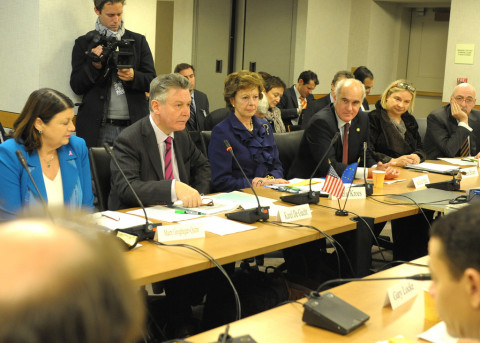Democracy in danger: the rise of illegitimate authority
Transnational corporations have an unbalanced influence on global and domestic politics, and are dangerous to democracy. Ignore them at your own peril.

What is legitimate government? Since the late 18th century, the Western consensus has required at a minimum popular sovereignty, free and fair elections and legally binding citizens' rights.
Differences of degree have always existed and the battle to extend democratic freedoms is never-ending and knows no frontiers. People now overthrow tyrants in unexpected places; millions of Egyptians have lately reminded us that the right to oust an elected leader who neither keeps his promises nor honours his obligations is also part of the democratic canon.
Legitimacy demands above all the consent of the governed. This in turn means that the governed must have the capacity to reject illegitimate authority. But what if they are unable to detect and identify illegitimate rule in the first place? What if the real governing bodies are shadowy entities, known mostly to specialists and which carefully refrain from publicising their activities? What is the citizens' recourse?
Knowledge is the first requirement and the media are of little help in this department. How many journalists let alone ordinary people have ever heard of the International Accounting Standards Board? How boring! Who wants to read about accounting? Invented as a simple advisory group by the European Union which needed to deal with many disparate accounting systems in its member states, the IASB brought together executives or retirees of the Big Four transnational accounting firms. It became official in 2005 and since then, dozens of countries including Australia have decided to follow its rules.
Why should we care? Simply because the world will never get rid of tax havens so long as the IASB is able to stonewall "country-by-country reporting" - the only system that could force transnational corporations (TNCs) to pay their taxes where their real economic activity takes place. Thanks to "transfer pricing" and various other legal dodges, the TNCs are causing governments to forfeit untold tax revenues that could improve the lot of their peoples. And so long as the top accounting firms make the rules by proxy, they will continue to do so.
Over 3,000 Bilateral Investment Treaties (BITs) are now in force and most include "investor-to-state dispute resolution" provisions. These allow investors - by definition TNCs - to sue governments if they believe that their present or even "expected" profits are harmed by any government measure. Australia wisely announced in 2011 that it would no longer include such clauses in future trade and investment treaties; too late, however, to avoid being sued by Philip Morris for its anti-smoking legislation.
Negotiations began last month on the most important free trade agreement ever drafted. The TTIP, or Transatlantic Trade and Investment Partnership, will make the rules for fully half the world economy's GDP. US-European annual goods and services trade amounts to some trillion and a half dollars, but there is little to negotiate on direct barriers such as tariffs - these average a mere 3 per cent. The goals are instead to eliminate BBBs or "behind borders barriers", including regulations and public services, and to obtain total freedom for TNC investors, particularly the investor-to-state clause.
Extra-judicial arbitration panels are increasingly replacing national courts and they can strike down consumer, public health and environmental protection laws as well as obtain mega-million dollar awards for TNCs whose turnover is often larger than the total GDP of the country being sued.
But just as is the case for the thousands of BITs, it's governments that negotiate the TTIP, no? What's illegitimate about that? Simply put, TNCs headquartered on both sides of the Atlantic have since the mid-1990s been deciding all the nuts-and-bolts issues in elaborate detail, sector by sector. Their venue was the Transatlantic Business Dialogue, newly morphed as the Transatlantic Economic Council. It describes its job as "reducing regulations to empower the private sector" and calls itself a "political body". Their website says proudly that this is the first time "the private sector [has] held an official role in determining EU/US public policy".
In 2012, governments met in Rio de Janeiro for the United Nations "Rio + 20" environmental conference. The representative of the International Chamber of Commerce was applauded when she announced on "Business Day" that "we are part of the largest business delegation ever to attend a UN conference" and told her audience that "business needs to take the lead and we are taking the lead." The TNCs are now demanding a formal role in UN climate negotiations.
It isn't just their size, enormous wealth and assets that make the TNCs dangerous to democracy. As the late Professor Ted Wheelwright often pointed out, it's also their concentration, their capacity to influence, indeed infiltrate governments and their ability to defend their interests as a genuine international social class.
Interchangeable, international, individually wealthy, nomadic, with common attributes, speaking a common language and sharing a common ideology, I call the people who increasingly run not just business but government the Davos Class. Citizens who value democracy ignore them at their peril.
Originally published at The Drum.
photo by Neelie Kroes
